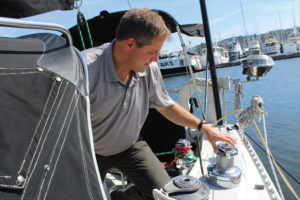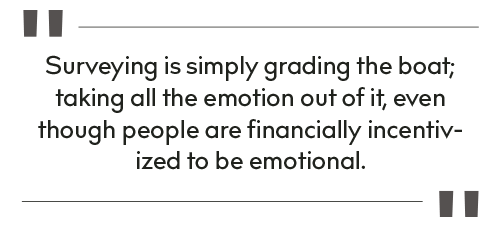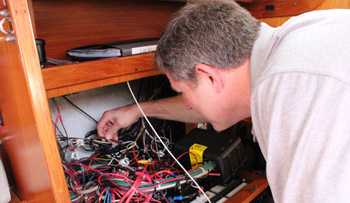“An investment in knowledge
pays the best interest.”
-Benjamin Franklin
Seeing a boat, especially for a potential buyer, is often an emotional experience. The rose-colored sunset casts the deck in a flattering light and already the soul yearns for blue horizons and a full fuel tank. “Let’s just get it already!” one wants to shout. Take a deep breath and heed conventional advice. Before you go any further, you’re going to want a professional marine surveyor to write up a report.
 Marine surveyors have established themselves over the last few decades as integral components of the boat-buying process, largely with the increased presence of boat insurance companies in the recreational sphere. Perhaps corporations, most of all, are inclined toward dispassionate analysis? Regardless, the marine surveyor’s job is to assess the true value and condition of a boat. No more, no less. The best surveyors seek the truth even as opposing forces, like overselling yacht brokers vs. under-offering boat buyers, are at odds around them. The ingredients for high stakes drama are a fact of life for the surveyor as large sums of money and the realization of lifelong dreams hinge on his or her every word.
Marine surveyors have established themselves over the last few decades as integral components of the boat-buying process, largely with the increased presence of boat insurance companies in the recreational sphere. Perhaps corporations, most of all, are inclined toward dispassionate analysis? Regardless, the marine surveyor’s job is to assess the true value and condition of a boat. No more, no less. The best surveyors seek the truth even as opposing forces, like overselling yacht brokers vs. under-offering boat buyers, are at odds around them. The ingredients for high stakes drama are a fact of life for the surveyor as large sums of money and the realization of lifelong dreams hinge on his or her every word.
For this month, we turned to Erik Bentzen, a locally based surveyor with over 35 years of experience with his own successful surveying and consulting firm, for a pro’s look at the marine industry from his seasoned perspective. We joined him aboard a J boat that he had surveyed in the past with our questions.
Q: Can you outline the process that leads clients to you? Joe and Mary see a boat they want to buy and they realize they should get a survey…
The process is not complicated per say, but definitely a sort of dance. When you see a boat that you like, you say, “What do I want to do next?” The next step is for you to write up an offer for that boat that’s contingent upon a survey. Some people buy a boat and try to do a survey after, and that’s not good at all. That situation makes my job not enjoyable, because nothing I can say will be good.
Q: Is that because there’s always something wrong?
Yes, there’s always something wrong. When I do a survey, I’m not looking at the great parts of a boat. I’m walking around and saying things like, “these are chaffed, so no heavy weather until they’re checked” or “the mast needs tuning” or “there’s grounding damage.” I’m concentrating on the deficiencies, so I’m not a cheerleader.
It’s important to note that, in all the transactions involved with a boat purchase, I’m the only person who is an advocate for the buyer. Everybody has their roles, like the sellers who are selling the boat and trying to get that commission. Mine is to provide the buyer with the truth about the boat’s worth.
Luckily, our area has a really great group of people who are all fundamentally honest and you’ll usually get a square deal. Outside of our area, it is much different and more like a shark tank, like if you were going into a used car lot.
If you get a surveyor, then you’ve got an advocate. They will inspect the boat, usually in one day for a mid-sized boat. Then they will leave, and write up a report. The report is really the work product we offer. It’s a PDF document we have with a list of what is there, an inventory, and what kind of boat it is, what’s the HIN number, is it registered, is it documented, what engine does it have, and much more. You’d think that’s repetitive, but it’s part of the process. What are we looking at? The fundamental purpose of all of this is to see what you’re buying vs. what you think you’re buying. I’d hopefully be able to answer that.
Then I put a fair market value on the boat, based on what I think the boat is worth, after I complete the document. Then I go and look at comparable boats or sold boats. I can hone into a comparable boat and come up with a fair market value. There’s always magnetic forces that try to pull me one way or another, but it’s my job to block them out and tell them what I truly think.
Q: Is there a lot of tension between you and brokers sometimes, like when they’re trying to sell a boat for a lot more than your fair market estimate?
Yes, brokers, use the words “deal killer” sometimes. I show up with the philosophy that, when I’m not surveying, I’m boating myself on the water. I’m in the industry, living and breathing in the industry and I know almost every player. So I don’t enjoy going around hacking people’s boats apart, that’s not my idea of fun. But it’s necessary to see if there is a deficiency that affects the value, or it doesn’t meet industry standard, or it’s dangerous. There’s plenty of dangerous ones, fire hazards and the like.
Q: So if these boats are American Idol contestants, you’re kind of the Simon Cowell on the panel?
I suppose so, but I never tell a potential buyer not to buy a boat. I just state the facts. If it is really bad, I might say “well, you know, this is a bit of a project.” I’d give many cues. How do you want to spend your time? Do you want to spend a lot of time in a boatyard?
Q: What are the top three surveyor “cues” or diplomatic sayings that hint to stay away?
Ha! Other surveyors do it differently, and they might just tell you their thoughts. I view my role as saying “what you’re buying and what you thought you’re buying are two separate things. This all can be repaired, but is this how you want to spend your time?” And of course, “it’s a project.” Spending six months re-coring the deck can break anybody’s spirit. Even though the broker may not be thrilled, it is what it is. I’m just seeing something and reporting back, I’m not inventing it. It can be uncomfortable.
“My father was a Danish shipwright and I grew up in the wood shavings in his shop. You hear some guys say that kind of thing, but in my case, it’s very true,” says Bentzen. His father was also one of the first accredited marine surveyors in Canada in an age when surveyors were not widely used in the recreational boating sphere. The two of them worked together as travelling surveyors when Benzten grew up and would eke out some time in between gigs to catch up over lunch.

With regards to smaller boats with auxiliary diesel engines, I would do a visual on the mechanical, but to go one level down, people get a full mechanical survey. Sometimes engines are half the value of the boat, so it can be important and worth it. With completed survey in hand, the buyer has his or her cards to play at the negotiating table. You know what you’re buying, what it’s going to cost, etc.
The Catch-22 is that everything I write down becomes a condition of your survey. Buying an old boat and fixing it up is harder now because of the insurance companies, who drive everything here and are the reason why you must have a survey these days. They will go “Great! You’ve got 30 days to repair the deficiencies on the survey.” This can mean an expensive, short-notice scramble to the boatyard.
One aspect of a survey to note is that whatever I look at does not require disassembly. Removing a wood panel into the bilge is fine, for example, but if there were screws to remove the deckhead to see the core, I would not do that. If a customer is present during the survey and wants to see something and has his own screwdriver, I will definitely look at it for him.
We can look at the boat and determine its condition within a day. But if you came down everyday for a week, your report would just keep growing. If I’m in the 80th percentile of what’s here and what’s going on, that means I’m going a great job. No person alive can do 100%. You can get close if you spend more time, but most people aren’t willing to compensate you for the time. It would be exhaustive. In certain cases, like bigger boats and racing boats, we’d do all of it in three days or so.
Q: Do people take you along on sea trials, or is that unusual?
 I try to do the survey within the bulk of a day. If in the middle of the day there is a sea trial and we can fit it in without interrupting my other work, it’s part of the package and no problem.
I try to do the survey within the bulk of a day. If in the middle of the day there is a sea trial and we can fit it in without interrupting my other work, it’s part of the package and no problem.
Q: Is payment prorated with the value of the boat, or is it a flat fee?
For me it’s a flat fee. Some go by the hour, which may be the most fair but also the most expensive. Some, like me, are by the flat fee by foot length plus expenses like travel. I travel all over the country and internationally.
Q: Is there some prep a client should do to make your job easier?
Ideally, if you make access easy it’s helpful. Liveaboards are the hardest because they have all their possessions aboard. Sometimes I just want to look under the V-berth, but it can take 45 minutes to get all the stuff out of the way. If it’s a race boat, the extensive sail inventory offloading can be time- consuming, but I need to have an inventory of all the equipment.
Q: Is there value to the above waterline survey, or should clients get the boat onto the hard for a complete survey?
Well, let’s go back a little. There are a few types of surveys. There’s a pre-purchase survey, which has much of the same content as an insurance survey. Sometimes I do just evaluation to settle disputes, as part of a closure of an estate, maybe a donation, but those can get you into trouble.
Then there’s the insurance renewal survey. If you shop for insurance, the first thing they’ll ask is for a current survey.
They want to know what they’re insuring. When you purchase without a survey, the insurance company will say that they need a survey. It’s the same amount of money, but the timing is off, to the disadvantage of the buyer. Buy a boat contingent upon a survey, always. It never used to be like that, but over the years, I’ve noticed the quality and safety of boats has gone way up. If a boat hasn’t been surveyed in 15 years, I know right away.
CONTACT
• Phone: 206-329-4459
• Website: erikbentzen.com

On my own boat in my personal life, the insurance rates are less than they used to be. The reason is because boats are better and the companies have to pay for fewer losses. It never pays to over inflate or under inflate a boat’s value because the insurance is going to go off what they think the boat is worth. With a survey, the owner has some good legs to stand on at the table.
If there is a list of deficiencies and you as my client don’t do anything about it, the survey can be used against you in the worst-case scenario, a loss. Your boat catches on fire or something, and I’ve listed some problems with your AC system in the survey. Your insurance company is going to pull that report and try to connect the dots to pay less.
Surveying is simply grading the boat, taking all the emotion out of it, even though people are emotionally and financially incentivized to be emotional.


